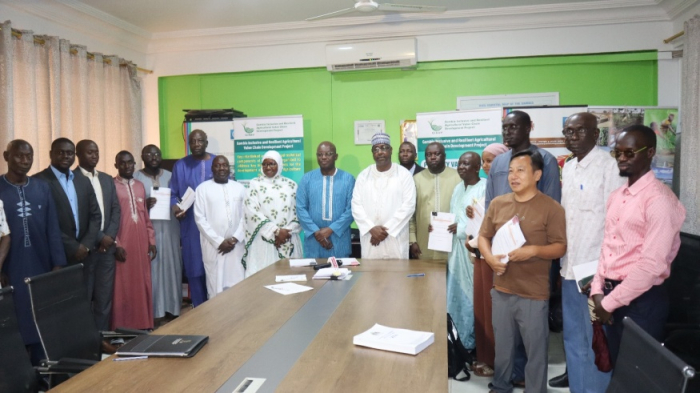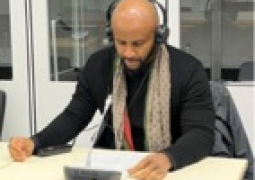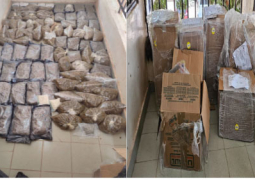
Dr. Demba Sabally, Minister for Agriculture, Livestock and Food Security (MoALFS) presided over the brief ceremony held at the Ministry’s conference room in Banjul on Monday, 15 July 2024.
Mr. Mod A. Secka, Permanent Secretary, MoALFS signed on behalf of the GIRAV Project whilst representatives of the six companies awarded the contracts to execute the 40 WYLAFs scheme signed on behalf of their respective firms.
The 40 WYALFs comprises 20 women-led agribusiness firms and 20 youth-led agribusiness firms. Each will be 5 hectares (totaling 200 hectares and directly benefitting 1000 women and 1000 youth).
This initiative is within the framework of Sub-component 2.1 of the project titled: ‘Promoting modern irrigation in women and youth-led agribusiness firms’. This sub-component will promote the development of new agribusiness firms led by women and youth (ages 18–35); these businesses will be equipped with greenhouses and modern irrigation technologies to produce horticultural crops using climate-smart practices. The special focus on women, who are already major actors in Gambian horticultural value chains, will help them shift from traditional subsistence-oriented community vegetable gardens to market-oriented firms producing high-quality horticultural products, leading to greater commercial activity in agriculture, improved climate resilience, and increased producer incomes. In the same vein, to attract young women and men to agribusiness, this subcomponent will promote modern youth-led firms, equipped with greenhouses and automatic irrigation and fertigation systems.
GIRAV is World Bank funded project designed to support agricultural value chains development and to move from subsistence to more market-oriented agriculture. The project is focusing on five priority value chains namely: Rice (substituting for increasing imports); Horticulture (vegetables and mangoes for urban centers and export) Cashew (for domestic processing and export) Poultry (for urban centers); and Maize (for poultry feed).
In his welcome remarks, Mod A. Secka Permanent Secretary, Ministry of Agriculture, Livestock and Food Security who chaired the ceremony underlined the importance of the timely execution of the civil works. He appealed to the contractors to measure up to expectations.
He said: “We want you to make sure that you deliver on time so that you don’t delay the project as well as the benefits that the communities would drive from it. I also call on the project team to put all mechanics in place to monitor the work to help ensure they deliver the contracts on time.”
In his remarks, Hon. Dr Demba Sabally, Minister of Agriculture, underscored the significance of the event. He reminded the gathering that the contracts that they are signing are very important towards the achievement of the Project outputs and impacts in regards the transformation of lives and livelihoods in the country.
Dr Sabally highlighted the importance of the proposed WYLAFs to the livelihoods of the target beneficiaries as well as to the national economy and the drive for food and nutrition security.
He said: “I want to congratulate the beneficiary groups and the contractors for going through the rigorous process which was also very transparent. Minister Sabally reminded the contractors that the Ministry has had bad experiences with contractors entrusted with the execution of agricultural projects and enjoined them to help in changing the narrative for the better.
“The communities are expecting a lot from us so the timely delivery of these gardens is important since it would be life-changing for the communities as it will economically empower the women and youths and also minimize our import bills as far as vegetables are concerned.”
He further explained that the WYLAFs are part of the government initiatives designed to empower women and youths and to create jobs and wealth. He therefore challenged the contractors to ensure that they deliver quality and standard results within the stipulated timeframe to enable the project beneficiaries and the economy to benefit from the investments.




